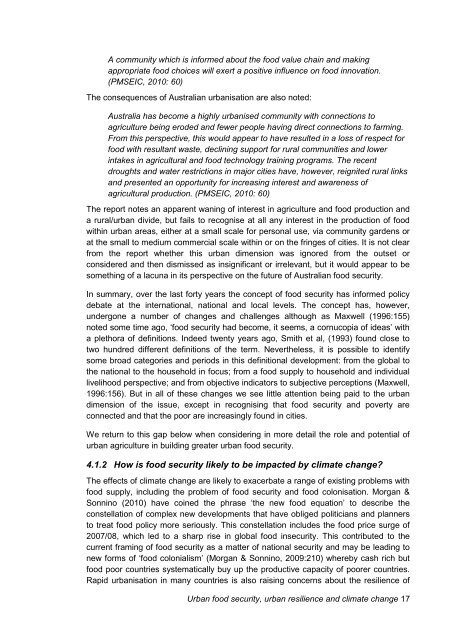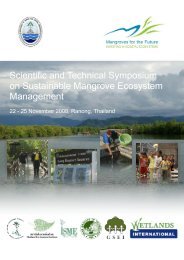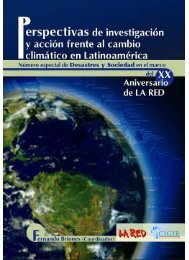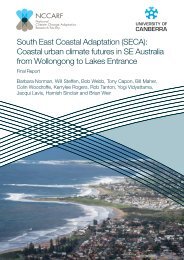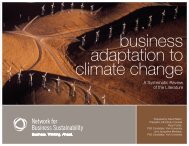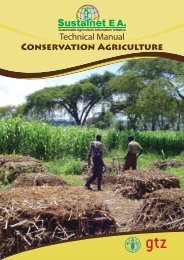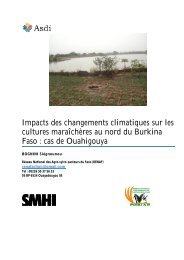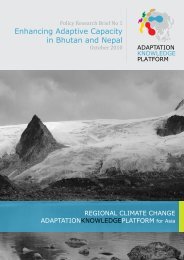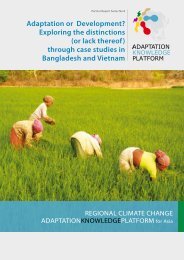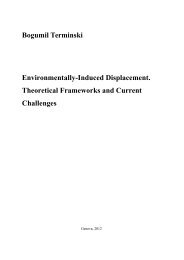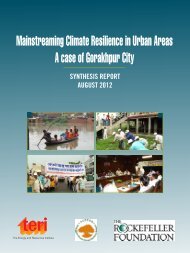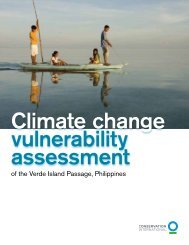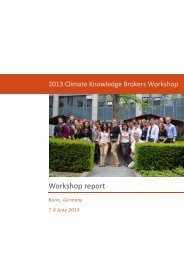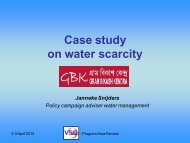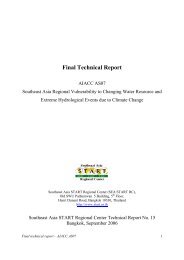A community which is informed about the <strong>food</strong> value chain <strong>and</strong> makingappropriate <strong>food</strong> choices will exert a positive influence on <strong>food</strong> innovation.(PMSEIC, 2010: 60)The consequences of Australian <strong>urban</strong>isation are also noted:Australia has become a highly <strong>urban</strong>ised community with connections toagriculture being eroded <strong>and</strong> fewer people having direct connections to farming.From this perspective, this would appear to have resulted in a loss of respect for<strong>food</strong> with resultant waste, declining support for rural communities <strong>and</strong> lowerintakes in agricultural <strong>and</strong> <strong>food</strong> technology training programs. The recentdroughts <strong>and</strong> water restrictions in major cities have, however, reignited rural links<strong>and</strong> presented an opportunity for increasing interest <strong>and</strong> awareness ofagricultural production. (PMSEIC, 2010: 60)The report notes an apparent waning of interest in agriculture <strong>and</strong> <strong>food</strong> production <strong>and</strong>a rural/<strong>urban</strong> divide, but fails to recognise at all any interest in the production of <strong>food</strong>within <strong>urban</strong> areas, either at a small scale for personal use, via community gardens orat the small to medium commercial scale within or on the fringes of cities. It is not clearfrom the report whether this <strong>urban</strong> dimension was ignored from the outset orconsidered <strong>and</strong> then dismissed as insignificant or irrelevant, but it would appear to besomething of a lacuna in its perspective on the future of Australian <strong>food</strong> <strong>security</strong>.In summary, over the last forty years the concept of <strong>food</strong> <strong>security</strong> has informed policydebate at the international, national <strong>and</strong> local levels. The concept has, however,undergone a number of <strong>change</strong>s <strong>and</strong> challenges although as Maxwell (1996:155)noted some time ago, ‘<strong>food</strong> <strong>security</strong> had become, it seems, a cornucopia of ideas’ witha plethora of definitions. Indeed twenty years ago, Smith et al, (1993) found close totwo hundred different definitions of the term. Nevertheless, it is possible to identifysome broad categories <strong>and</strong> periods in this definitional development: from the global tothe national to the household in focus; from a <strong>food</strong> supply to household <strong>and</strong> individuallivelihood perspective; <strong>and</strong> from objective indicators to subjective perceptions (Maxwell,1996:156). But in all of these <strong>change</strong>s we see little attention being paid to the <strong>urban</strong>dimension of the issue, except in recognising that <strong>food</strong> <strong>security</strong> <strong>and</strong> poverty areconnected <strong>and</strong> that the poor are increasingly found in cities.We return to this gap below when considering in more detail the role <strong>and</strong> potential of<strong>urban</strong> agriculture in building greater <strong>urban</strong> <strong>food</strong> <strong>security</strong>.4.1.2 How is <strong>food</strong> <strong>security</strong> likely to be impacted by <strong>climate</strong> <strong>change</strong>?The effects of <strong>climate</strong> <strong>change</strong> are likely to exacerbate a range of existing problems with<strong>food</strong> supply, including the problem of <strong>food</strong> <strong>security</strong> <strong>and</strong> <strong>food</strong> colonisation. Morgan &Sonnino (2010) have coined the phrase ‘the new <strong>food</strong> equation’ to describe theconstellation of complex new developments that have obliged politicians <strong>and</strong> plannersto treat <strong>food</strong> policy more seriously. This constellation includes the <strong>food</strong> price surge of2007/08, which led to a sharp rise in global <strong>food</strong> in<strong>security</strong>. This contributed to thecurrent framing of <strong>food</strong> <strong>security</strong> as a matter of national <strong>security</strong> <strong>and</strong> may be leading tonew forms of ‘<strong>food</strong> colonialism’ (Morgan & Sonnino, 2009:210) whereby cash rich but<strong>food</strong> poor countries systematically buy up the productive capacity of poorer countries.Rapid <strong>urban</strong>isation in many countries is also raising concerns about the <strong>resilience</strong> of<strong>Urban</strong> <strong>food</strong> <strong>security</strong>, <strong>urban</strong> <strong>resilience</strong> <strong>and</strong> <strong>climate</strong> <strong>change</strong> 17
<strong>urban</strong> <strong>food</strong> supply chains. Thus, while the effects of more variable rainfall patterns,more very hot days, more severe storms <strong>and</strong> changing patterns of vector bornediseases are likely to have profound effects on traditional agricultural practices ingeneral, they will also affect <strong>urban</strong> agriculture.In Australia, the <strong>climate</strong> projections from the CSIRO <strong>and</strong> the Bureau of Meteorology(CSIRO 2007) show which elements of significance to agriculture will <strong>change</strong> mostunder <strong>climate</strong> <strong>change</strong>. The National Food Plan consultation document (DAFF, 2011)presents projections which show that: Temperatures in Australia could increase by 2.2°C to 5°C by 2070;Annual rainfall in south-west Australia could reduce by up to 10%, <strong>and</strong> by 2 to5% elsewhere in southern Australia;Drought occurrence could increase over most of Australia, but particularly insouth-west Australia;Australia‘s <strong>climate</strong> will remain highly variable with the early effects of <strong>climate</strong><strong>change</strong> being felt through gradual <strong>change</strong>s in mean temperature, as well asthrough likely <strong>change</strong>s in the frequency, duration <strong>and</strong>/or intensity of extremeevents, such as droughts, heatwaves, fires <strong>and</strong> floods;Although there may be more dry days, when it does rain, rainfall may be heavierthan previously experienced in the region;Hot days <strong>and</strong> warm nights are projected to become more frequent.Climate <strong>change</strong>s are likely to affect agriculture productivity in a number of ways, due toplant <strong>and</strong> animal heat stress, less predictable seasons, crop <strong>and</strong> livestock losses fromflood <strong>and</strong> drought <strong>and</strong> <strong>change</strong>s in the regional suitability of certain production systems.One of the most significant reviews of <strong>food</strong> <strong>security</strong> in Australia is included in the recentreport from PMSEIC (2010), entitled Australian <strong>and</strong> Food Security in a ChangingWorld. This notes that <strong>climate</strong> <strong>change</strong> will have a number of direct impacts on <strong>food</strong>production as a result of changing patterns of rainfall, more very hot days <strong>and</strong> soilerosion. However, there are also likely to be significant indirect effects such asdisruptions to supply lines as a result of floods, cyclones <strong>and</strong> more very hot days.Nonetheless, a government view as portrayed by the Australian Bureau of Agricultural<strong>and</strong> Resource Economics (ABARE) is relatively sanguine. While Australia’s economicoutput is likely to be affected by <strong>climate</strong> <strong>change</strong> effects on agriculture, in the long term,<strong>climate</strong> <strong>change</strong> does not present a substantial physical threat to Australia’s physical<strong>food</strong> <strong>security</strong> (Sheales <strong>and</strong> Gunning-Grant, 2009). In addition, trade <strong>and</strong> participation inthe global economy is likely to continue to buffer the impact of threats to Australia’s<strong>food</strong> <strong>security</strong> (Moir <strong>and</strong> Morris, 2011).While the policy discourse is relatively stable around the findings of the CSIRO <strong>and</strong> theassumption that trade <strong>and</strong> open markets will prevent a <strong>food</strong> <strong>security</strong> risk in Australia,an emerging body of scientific literature is providing a more nuanced <strong>and</strong> critical viewof the impacts of <strong>climate</strong> <strong>change</strong> compared to the government’s responses. Forexample, Bloom et al., (2010) show that as atmospheric CO2 rises, plants (in this case,wheat <strong>and</strong> Arabidopsis) will have more trouble absorbing nitrates into their tissues<strong>Urban</strong> <strong>food</strong> <strong>security</strong>, <strong>urban</strong> <strong>resilience</strong> <strong>and</strong> <strong>climate</strong> <strong>change</strong> 18
- Page 1 and 2: Synthesis and Integrative ResearchF
- Page 3 and 4: Published by the National Climate C
- Page 5 and 6: ABSTRACTFood security is increasing
- Page 7 and 8: 1. a review of the literature: on n
- Page 9 and 10: its Food for All project. This help
- Page 13 and 14: In response to the existential thre
- Page 15 and 16: 2. OBJECTIVES OF THE RESEARCHFood i
- Page 17 and 18: debates and to the more systematic
- Page 19 and 20: organisation in the past few years.
- Page 21 and 22: 4. RESULTSIn this section we presen
- Page 23 and 24: increasing productivity. Thus, whil
- Page 25: people and the origins of their foo
- Page 29 and 30: This logistics system is dominated
- Page 31 and 32: Like Hodgson et al., as per definit
- Page 33 and 34: esilient, powerful by being locally
- Page 35 and 36: volume or even its contribution to
- Page 37: community food growing can have on
- Page 40 and 41: generations this history has been f
- Page 42 and 43: a stronger focus on addressing the
- Page 44 and 45: The third key aspect is fairness -
- Page 46 and 47: climate (which we live and work in
- Page 48 and 49: agriculture. Eight percent is in ur
- Page 50 and 51: This concept of the ‘spaces in be
- Page 52 and 53: esearch scientist and chair of the
- Page 54 and 55: As discussed above, protection of t
- Page 56: 4.2.5 What is the extent and the im
- Page 60 and 61: no place under the panoply of pract
- Page 62 and 63: increased, the market dominance of
- Page 64 and 65: … the residents of S Park called
- Page 66 and 67: 5. CONCLUSIONSThere is growing conc
- Page 68 and 69: urban resilience. This inevitably c
- Page 70 and 71: In many respects these contrasting
- Page 72 and 73: Many interviewees of both standpoin
- Page 74 and 75: a given area. The rationale for thi
- Page 76 and 77:
mapping the location of sources of
- Page 78 and 79:
Australian food policy debates refl
- Page 80 and 81:
APPENDIX 1: URBAN FOOD SECURITY, UR
- Page 82 and 83:
IntroductionGlobally, and in Austra
- Page 84 and 85:
Review methodsThis stage of the res
- Page 86 and 87:
despite many of the causes of food
- Page 88 and 89:
…by 2050… food production will
- Page 90 and 91:
2. How is food security (in general
- Page 92 and 93:
the food security of cities, but no
- Page 94 and 95:
While some see the density of devel
- Page 96 and 97:
when suppliers, distributors, and c
- Page 98 and 99:
a more prominent role in enhancing
- Page 100 and 101:
community gardens webpage on the Co
- Page 102 and 103:
comprehensive description of the ca
- Page 104 and 105:
In both the developed and developin
- Page 106 and 107:
Their review notes a significant in
- Page 108 and 109:
lines of supply from often rural pl
- Page 110 and 111:
1 IntroductionCities have always be
- Page 112 and 113:
Despite some attempts to curb urban
- Page 114 and 115:
the Gold Coast remains a city that
- Page 116 and 117:
ackyard/community gardenernot affil
- Page 118 and 119:
level in local government. VicHealt
- Page 120:
Figure 2: Impacts on Municipal Food
- Page 125 and 126:
security I recognise that the cost
- Page 127 and 128:
United States, he offered the follo
- Page 129 and 130:
This vision highlights the multi-fu
- Page 131 and 132:
An environmental education centre.
- Page 133 and 134:
Melbourne Food ForestA Melbourne ga
- Page 135 and 136:
stakeholder consultations, the repo
- Page 137 and 138:
can. We sense the changes. The earl
- Page 139 and 140:
half-desert environments. We’re g
- Page 141 and 142:
etain its basic function and struct
- Page 143 and 144:
government; and that trying to get
- Page 145 and 146:
the north and the west, where it wo
- Page 147 and 148:
Why do people buy so much food that
- Page 149 and 150:
urban agriculture (however broadly
- Page 151 and 152:
enefits and risks. Before we can co
- Page 153 and 154:
Another important and tangible role
- Page 155 and 156:
coast without any problems whatsoev
- Page 157 and 158:
BIBLIOGRAPHYAECOM (2011) Scoping St
- Page 159 and 160:
Burns, C. I., A. (2007). Measuring
- Page 161 and 162:
Edwards, F., & Mercer, D. (2010). M
- Page 163 and 164:
James, S. O’Neill, P. and Dimeski
- Page 165 and 166:
Millar, R., 2012, ‘Government shi
- Page 167 and 168:
Saltmarsh, N. M., J; Longhurst, N.
- Page 169 and 170:
Walker B., 2008, Resilience Thinkin


